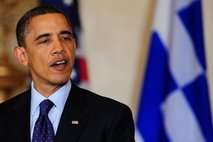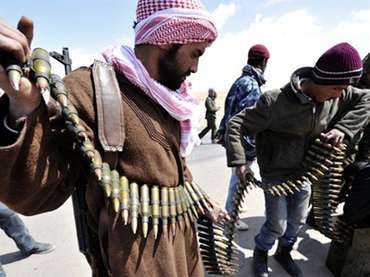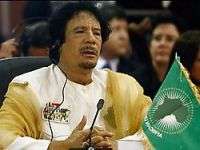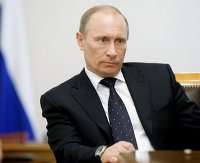|
|
By Timothy Bancroft-Hinchey
- March 29, 2011
 Dear President Obama, President Sarkozy and Prime Minister Cameron,
Thank you for caring about the welfare of human beings. Thank you for your concern about the safety of innocent civilians.
As you will be aware, the United Nations Organization had planned, this month, to pay homage to Muammar Al-Qathafi for his human rights record, after a carefully researched report was drawn up, praising him for his tremendous humanitarian work not only in his own country but across the African continent, where he is much respected.
Now a question. If a group of carefully trained heavily armed citizens seized power, burnt buildings, massacred civilians and destroyed government property in, say, Texas, Northern Ireland or Corsica, what would the authorities of your countries do? Stand back with their hands over their hearts or meet the challenge with armed security forces? You do know who started the massacres in Benghazi?
By Marc Ambinder
- March 29, 2011
 As President Obama attempts to draw a circle around the military engagement in Libya on Monday night, he is simultaneously drafting an annex to the doctrine of American power that circumscribes his own actions. Obama is going to try to tell us when he thinks that America's awesome arsenal should be put to use against bad people, and then the circumstances that don't call for the exercise of war-making.
When a president orders troops into battle, his justification is usually a consequence of policy (when such intervention is warranted), capacity (do we have the resources to do it?) and exigency (what precipitated the action?).
Libya seems easy: the universal dignity of all humans is something America respects and has the ability to protect, and the slaughter of civilians was imminent. But some clarification is warranted.
By RT
- March 28, 2011

Gumer Isayev, Middle East expert and faculty professor at St. Petersburg State University, talks to Gazeta.ru about causes behind the conflict in Libya, Jamahiriya, the Green Book, and Russia’s stand in regard to the Libyan conflict.
West Takes Advantage of the Situation
Q: Being an expert on the Middle East, how do you assess the recent events in Libya? What’s actually happening there, is it a “clash of civilizations”, a “crusade’, an attempt to protect democracy in Libya, or an attempt to overthrow Gaddafi’s regime orchestrated by some countries, or perhaps a war for Libya’s natural resources, or still something else?
A: Any attempts to explain the events in Libya drawing on the abstract concepts produced by the West – such as for instance the “clash of civilizations” – are doomed to fail just as much as the attempts to come up with a strictly rational explanation. Revolutions, overthrows, and uprisings are irrational by nature and often develop in an unpredictable manner which does not fit any conventional theories. The events in Libya unrolled rapidly and were shaped by a number of factors, and while both Egyptian and Tunisian presidents gave up quite quickly, Muammar Gaddafi made it clear right away that he will fight to the end. Consequently, the internal uprising against Gaddafi which started in February developed into armed aggression against Libya by March, and God knows what it will be like by April…
Obviously, the “uprising” in Libya was inspired by popular unrest in the neighboring Arab countries.
But unlike the peaceful protests in Tunisia and Egypt, Libya’s uprising was armed, and quite possibly relied on some external support.
By Liza Karpova
- March 27, 2011
 The Libyan leader proposed the nationalisation of U.S. oil companies, as well as those of UK, Germany, Spain, Norway, Canada and Italy in 2009.
On January 25, 2009, Muammar Al Gaddafi announced that his country was studying the nationalisation of foreign companies due to lower oil prices.
"The oil-exporting countries should opt for nationalisation because of the rapid fall in oil prices. We must put the issue on the table and discuss it seriously," said Gaddafi.
"Oil should be owned by the State at this time, so we could better control prices by the increase or decrease in production," said the Libyan leader.
These statements have worried the main foreign companies operating in Libya: Anglo-Dutch Shell, British Petroleum, U.S. ExxonMobil, Hess Corp., Marathon Oil, Occidental Petroleum and ConocoPhillips, the Spanish Repsol, Germany's Wintershall, Austria's OMV , Norway's Statoil, Eni and Canada's Petro Canada.
In 2008, the Libyan state oil company, National Oil, prepared a report on the subject in which officials suggested modifying the production-sharing agreements with foreign companies in order to increase state revenues.
By RIA Novosti
- March 25, 2011
 Vladimir Putin released an official statement about the situation in Libya, where NATO launched Operation Odyssey Dawn approved by most recent resolution of the UN Security Council. The head of the Russian government criticized the positions of all sides in the conflict - NATO, the UN Security Council and Libyan leader Muammar Gaddafi.
To avoid possible questions beyond his competence, Putin said that he did have a personal attitude to the events in Libya, even though the Russian government was not dealing with foreign political issues.
Russia does not participate in the military operation in Libya and abstained from voting at the UN Security Council. Russian top politicians did not release any landmark statements during the time when the world media were discussing the oncoming operation either.
Vladimir Putin stated on March 21 that the resolution of the UN Security Council on Libya was flawed.
"The Security Council resolution is deficient and flawed; it allows everything and is reminiscent of a medieval call for a crusade," Putin told workers at a ballistic missile factory in the Urals region. "It effectively allows intervention in a sovereign state," RIA Novosti quoted him as saying.
|
|
|
|
|
|  |
|
 Dear President Obama, President Sarkozy and Prime Minister Cameron,
Dear President Obama, President Sarkozy and Prime Minister Cameron,
 We recommend
We recommend



 As President Obama attempts to draw a circle around the military engagement in Libya on Monday night, he is simultaneously drafting an annex to the doctrine of American power that circumscribes his own actions. Obama is going to try to tell us when he thinks that America's awesome arsenal should be put to use against bad people, and then the circumstances that don't call for the exercise of war-making.
As President Obama attempts to draw a circle around the military engagement in Libya on Monday night, he is simultaneously drafting an annex to the doctrine of American power that circumscribes his own actions. Obama is going to try to tell us when he thinks that America's awesome arsenal should be put to use against bad people, and then the circumstances that don't call for the exercise of war-making.
 The Libyan leader proposed the nationalisation of U.S. oil companies, as well as those of UK, Germany, Spain, Norway, Canada and Italy in 2009.
The Libyan leader proposed the nationalisation of U.S. oil companies, as well as those of UK, Germany, Spain, Norway, Canada and Italy in 2009. Vladimir Putin released an official statement about the situation in Libya, where NATO launched Operation Odyssey Dawn approved by most recent resolution of the UN Security Council. The head of the Russian government criticized the positions of all sides in the conflict - NATO, the UN Security Council and Libyan leader Muammar Gaddafi.
Vladimir Putin released an official statement about the situation in Libya, where NATO launched Operation Odyssey Dawn approved by most recent resolution of the UN Security Council. The head of the Russian government criticized the positions of all sides in the conflict - NATO, the UN Security Council and Libyan leader Muammar Gaddafi.